2019年(春)七年级英语下册 Unit 3 Will people have robots?Period 5导学案 鲁教版五四制.doc
2019年鲁教版初一英语七年级下册Unit 3《Will people have robots》(Section A)ppt课件

A: Will people live to be 200 years old?
B: Yes, they will./ No, they won’t. live to be +基数词 years old “ 活到多少 岁”
People won’t use money.
Everything will be free.
Grammar Focus
Cities will be very big and crowded.
In the future ! free
A: Will people use money in the future? B: No, they won’t. Because everything will be free.
Books will only be on computers, not on paper.
4. Kids won’t go to school. They’ll study at
A A D D home on computers.
5.There will only be one country.
1c Ask and answer questions about the predictions in 1a. A: Will people use money in 100 years? B: No, they won’t. Everything will be free. Will people live to be 200 years old? A: Yes, they will.
2c Make conversations about the predictions in 2a and 2b.
鲁教版英语七年级下Unit3 Will people have robots SectionA (1)
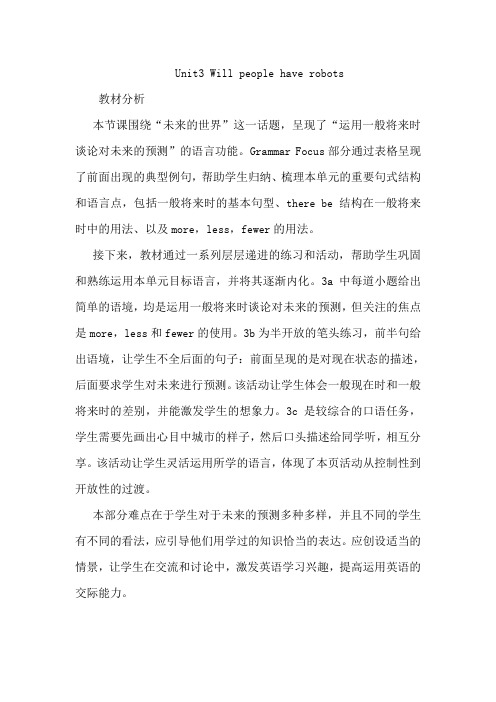
Unit3 Will people have robots
教材分析
本节课围绕“未来的世界”这一话题,呈现了“运用一般将来时谈论对未来的预测”的语言功能。
Grammar Focus部分通过表格呈现了前面出现的典型例句,帮助学生归纳、梳理本单元的重要句式结构和语言点,包括一般将来时的基本句型、there be结构在一般将来时中的用法、以及more,less,fewer的用法。
接下来,教材通过一系列层层递进的练习和活动,帮助学生巩固和熟练运用本单元目标语言,并将其逐渐内化。
3a中每道小题给出简单的语境,均是运用一般将来时谈论对未来的预测,但关注的焦点是more,less和fewer的使用。
3b为半开放的笔头练习,前半句给出语境,让学生不全后面的句子:前面呈现的是对现在状态的描述,后面要求学生对未来进行预测。
该活动让学生体会一般现在时和一般将来时的差别,并能激发学生的想象力。
3c是较综合的口语任务,学生需要先画出心目中城市的样子,然后口头描述给同学听,相互分享。
该活动让学生灵活运用所学的语言,体现了本页活动从控制性到开放性的过渡。
本部分难点在于学生对于未来的预测多种多样,并且不同的学生有不同的看法,应引导他们用学过的知识恰当的表达。
应创设适当的情景,让学生在交流和讨论中,激发英语学习兴趣,提高运用英语的交际能力。
七年级下册unit 3《will people have robots》(sectionb selfcheck)课件
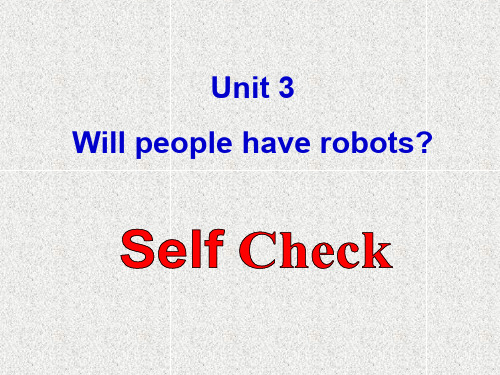
(有更多的空闲时间) in the future. 4. Do you think there _w_i_ll_ _b_e__ _l_e_s_s _ _p_o_ll_u_t_io_n__
7. 人将会更多。 __T_h_e_r_e_w__il_l _b_e_m__o_r_e_p_e_o_p_l_e_i_n_t_h_e future.
8. 将会有更少的车子。 _T_h_e_r_e_w__il_l_b_e_f_e_w_e_r__c_a_rs_._____
9. 将会有更少的污染。 _T_h__er_e__w_i_ll_b_e__le_s_s_p_o_l_l_u_ti_o_n_.__
vacations.
Ⅱ. 用more, less, fewer 填空
1. We plant trees every year, there will be _m_o_r_e_ trees. 2. If we waste water, there will be __le_s_s_ water. 3. If every family has a baby, there will be _m_o_r_e_ people. 4. I think English is _le_s_s_/_m_o_r_e_ popular than Chinese. 5. There will be _m__o_r_e_ robots everywhere, and
2. We all know Brazil ___w_o_n__ (win) the World Cup last year.
七年级英语下册 Unit 3 Will people have robots Secion A(1a

Unit 3 Will people have robots? Section A( 1a-2d)一、【学习目标】:1、能灵活运用本课所学新词汇。
2、能理解will 构成的一般将来时态的陈述句、否定句、疑问句及回答。
3、能通过做预言,谈论未来发生的事情。
二、【知识学习】:自读文本,预习交流图片你认为人们家里将会有机器人吗?是的,会有的。
我想家家有会有一个机器人。
孩子们还去学校上学吗?孩子们将不再去学校上学。
他们将在家中通过电脑来学习。
1a 人们家里见会有机器人。
人们将不再使用钱。
一切都将是免费的。
书只会在电脑上出现,而不会在纸上。
孩子们将不去上学。
他们将在家里通过电脑学习。
将会只有一个国家。
人们将会活到200岁。
1c100年后人们还用钱吗?不,不用了。
一切都将会是免费的。
人们会活到200岁吗?是的,他们会的。
2a 1.将会有更多的人。
2.将会有更少的空余时间。
3.将会有更少的小汽车。
4.将会有更少的污染。
5.将会有更少的树。
2b 1.将会有更少的人。
3.人们会更少的使用地铁。
5.城市将会庞大且拥挤不堪。
2c我认为将会有更多的污染。
喂,我不同意。
但我认为将有更少的树木。
我同意。
Grammar Focus将会有更少的污染吗?不,不会的。
将会有更多的污染。
将会有更少的树吗?对,会的。
孩子们将不去上学。
孩子们将在家中通过电脑学习。
将会有更少的树。
将会有更少的污染。
3a五年前,拉萨在上高中。
她踢足球。
她有一只猫。
现在,拉萨在上大学。
她弹吉他。
她有一条狗。
五年后,拉萨将是一名医生(已婚的),她将打网球。
她将有一辆跑车(一个孩子)。
3b你认为拉萨五年后会做什么工作?我认为她会是一名医生。
她将进行什么体育运动?4我认为将有更多的高楼。
而且小轿车会更少并且公交车会更多。
【课堂导学】1、交流检查课前准备部分,师生互问探讨解决问题。
2、听录音,完成1b、2a、2b。
3、.口语练兵场:1) ---Will you…?--Yes, I will / No, I won’t.2) ---Will there be…?--Yes, there will./ No, there won’t.4、学习成果展示:What will happen in 100 years? Could you make some predictions(做出预言)? Please talk with your partners.三、【问题探究】:一)、Will(将要)表示将来,用于一般将来时。
七年级英语下册:Unit3WillpeoplehaverobotsSectionA11a-1d教案58
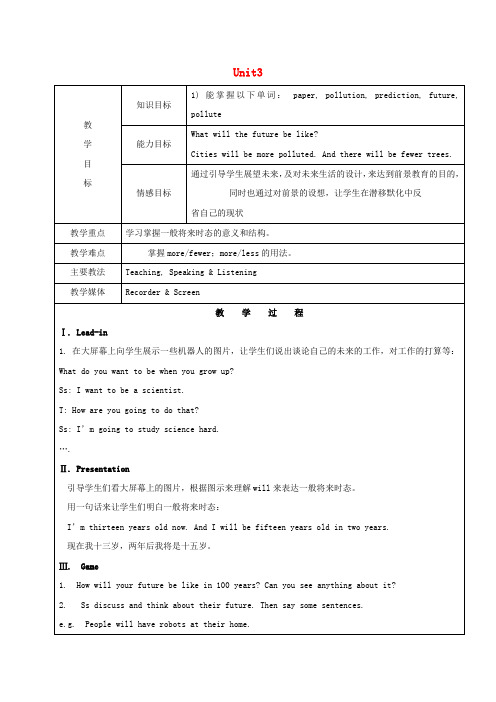
….
Ⅱ. Presentation
引导学生们看大屏幕上的图片,根据图示来理解will来表达一般将来时态。
用一句话来让学生们明白一般将来时态:
I’m thirteen years old now. And I will be fifteen years old in two years.
现在我十三岁,两年后我将是十五岁。
Ⅲ. Game
1. How will your future be like in 100 years? Can you see anything about it?
2. Ss discuss and think about their future. Then say some sentences.
e.g. People will have robots at their home.
There will be only one country.
People won’t use money in the future.
Ⅳ. Listening
1. T: Now listen to the recording and circle the predictions you hear in1a.
2. Play the recording for the Ss to listen and circle the predictions.
Ⅴ. Pair work
1. Let Ss read the first conversation in1cafter the teacher.
2. Then let Ss ask and answer questions about the predictions in1a. Then make their own conversation.
初中七年级英语下册 Unit 3 Will people have robots?SectionB(1a-1e)
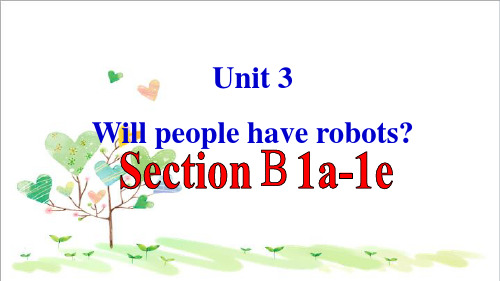
A. is BD. will
C. was D. are
6.There is_______ meat but_______ cakes on
the plate. Please have one.
7.There is very ___D____on this street.
A. few traffics
B. little traffics
C. few traffic
D. little traffic
8.What is your favorite 21st cDentury prediction
? —I predict there will be _______leisure time.
2a Tell your partner what you know about robots. What do they look like and what can they do?
Ⅰ. 用一般将来时填空。(借助will)
1. I _w__il_l_v_i_s_it_ (visit) my uncle tomorrow. 2. There _w__il_l _b_e_ (be) a football match in
1b Think of other words and write them in the chart in 1a.
Jobs
Transportation
Places to live
astronaut
train rocket
computer
space ship
programmer robot cleaner
鲁教版七年级英语下册Unit 3 Will people have robots Self-chec
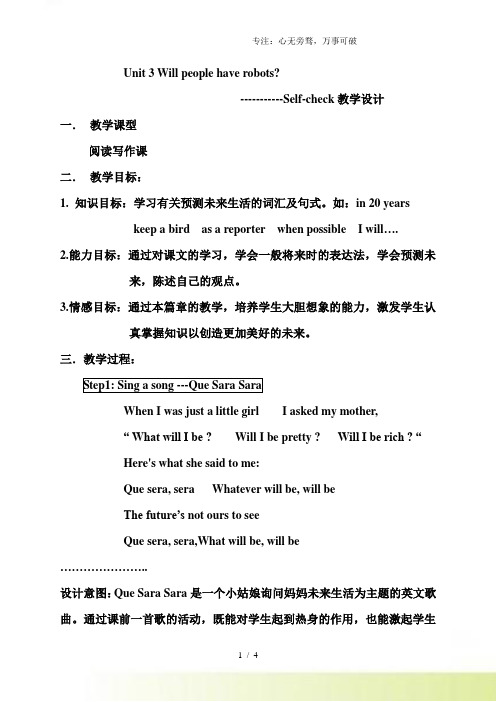
Unit 3 Will people have robots?-----------Self-check教学设计一.教学课型阅读写作课二.教学目标:1.知识目标:学习有关预测未来生活的词汇及句式。
如:in 20 yearskeep a bird as a reporter when possible I will….2.能力目标:通过对课文的学习,学会一般将来时的表达法,学会预测未来,陈述自己的观点。
3.情感目标:通过本篇章的教学,培养学生大胆想象的能力,激发学生认真掌握知识以创造更加美好的未来。
三.教学过程:Step1: Sing a song ---Que Sara SaraWhen I was just a little girl I asked my mother,“ What will I be ?Will I be pretty ? Will I be rich ? “Here's what she said to me:Que sera, sera Whatever will be, will beThe future’s not ours to seeQue sera, sera,What will be, will be…………………..设计意图:Que Sara Sara是一个小姑娘询问妈妈未来生活为主题的英文歌曲。
通过课前一首歌的活动,既能对学生起到热身的作用,也能激起学生预测未来生活的兴趣。
Step2: Free talkT: In the beautiful song, the little girl asks her mother “What will I be? Will I be handsome? Will I be rich?”, so what about you?Will you be rich?S: I think I will be not rich enough.T: What will you do in the future?S: Maybe I will be a teacher. As a teacher, I will make my class interesting. 设计意图:利用歌词中小姑娘问妈问题,很自然的过渡区询问学生这三个问题“未来,你会做什么工作?你会很富有吗?”调动了学生交谈的自己情况的兴趣,同时也为下一步的阅读扫清障碍。
鲁教版英语七年级下Unit3 Will people have robots (1)

Unit3 Will people have robots教学设计Step 1 Before ReadingTalk about three pictures about robots .What do they look like ?What can they do ?Picture 1 They look like humans ,they can play soccer.Picture 2 It looks like a snake, it can help find the people under the buildings.Picture 3 It looks like a girl , it can sing and dance.Step 2 While Reading1.Fast readingRead the article as fast as you can ,and match each paragraph with the questions.2.Scanning(1)Look at the chart ,read the article again and catch the details you need. Check the answers .Pay attention to which paragraph and which sentence is the answer in .(2)Finish 2c on page 22 . Check the answers .3.Intensive reading(1)Read the first paragraph . Explain help with sth \ do sth help sb do sth 完成随堂训练(2)Read the second paragraph . Explain:①There be sb doing sth ②over and over again ③boring \ bored 完成随堂训练(3)Read the third paragraph . ①try to do\ doing ②长句翻译However, some scientistsbelieve that although we can make robots move like people,it will be difficult to makethem really think like a human. ③Find the different ideas of the scientists ④be able to \can(4)Read the fourth paragraph . Explain:①确数与约数的表达②possible完成随堂训练4.After readingFinish 2d on page 22 . Check the answers.5.ExpansionShow the students a pictureAsk : What does it look like ? What will it be able to do ?Write down the sentences and make a short passage.6.SummaryThis class we know there are many kinds of robots in the world . They look like humans and animals . We also know how to predict what robots will be like in the future . But do you think it’s the scientists’ duty (责任)to make more robots?Yes ,it’s your duty ,too .。
鲁教版英语七年级下Unit3 Will people have robots SectionB (5)
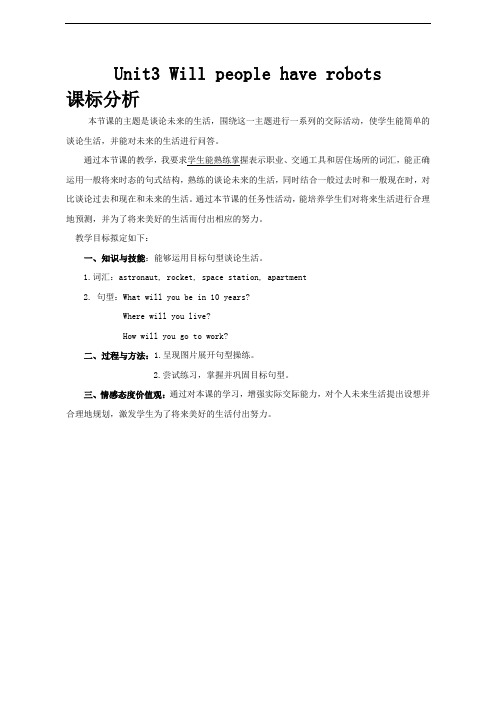
Unit3 Will people have robots
课标分析
本节课的主题是谈论未来的生活,围绕这一主题进行一系列的交际活动,使学生能简单的谈论生活,并能对未来的生活进行问答。
通过本节课的教学,我要求学生能熟练掌握表示职业、交通工具和居住场所的词汇,能正确运用一般将来时态的句式结构,熟练的谈论未来的生活,同时结合一般过去时和一般现在时,对比谈论过去和现在和未来的生活。
通过本节课的任务性活动,能培养学生们对将来生活进行合理地预测,并为了将来美好的生活而付出相应的努力。
教学目标拟定如下:
一、知识与技能:能够运用目标句型谈论生活。
1.词汇:astronaut, rocket, space station, apartment
2. 句型:What will you be in 10 years?
Where will you live?
How will you go to work?
二、过程与方法:1.呈现图片展开句型操练。
2.尝试练习,掌握并巩固目标句型。
三、情感态度价值观:通过对本课的学习,增强实际交际能力,对个人未来生活提出设想并合理地规划,激发学生为了将来美好的生活付出努力。
2019年鲁教版初一英语七年级下册Unit 3《Will people have robots》(Section B)ppt课件
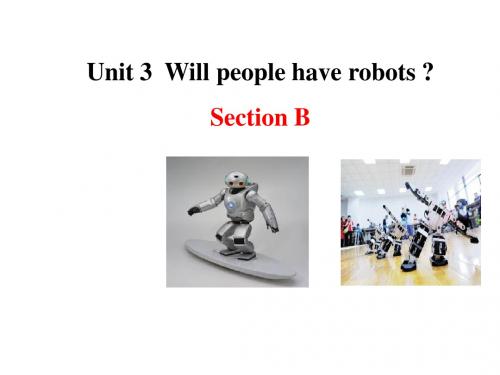
Section B
Lead in
Answer the following questions. Q1.Where did you study 5 years ago?
Q2.Where do you study now?
Q3.Where will you study in 5 years?
Pair work
A: Where do you live? B: I live in … . A: Where did you live ten years ago? B: I lived in … . A: What do you do?/ What’s your job? B: I’m a/ an … . A: What do you think you will be in ten years? B: I think I will be … . A: Where will you live? B: I will live … .
1e Student A is Alexis and Student B is Joe. Talk about
Joe’s life now, 10 years ago and 10 years from now. A: Where do you live?
B: I live in an apartment.
Transportation
rocket
train
Places to live
space station
apartment
house
1a
Write each word in the correct column below.
七年级英语下册 Unit 3 Will people have robots Section B4(

2016-2017学年七年级英语下册Unit 3 Will people have robots Section B4(3a-Self check)教案鲁教版五四制
编辑整理:
尊敬的读者朋友们:
这里是精品文档编辑中心,本文档内容是由我和我的同事精心编辑整理后发布的,发布之前我们对文中内容进行仔细校对,但是难免会有疏漏的地方,但是任然希望(2016-2017学年七年级英语下册Unit 3 Will people have robots Section B4(3a-Self check)教案鲁教版五四制)的内容能够给您的工作和学习带来便利。
同时也真诚的希望收到您的建议和反馈,这将是我们进步的源泉,前进的动力。
本文可编辑可修改,如果觉得对您有帮助请收藏以便随时查阅,最后祝您生活愉快业绩进步,以下为2016-2017学年七年级英语下册Unit 3 Will people have robots Section B4(3a-Self check)教案鲁教版五四制的全部内容。
Unit3。
鲁教版七年级英语下册Unit 3 Will people have robots Section A

Unit 3 Will people have robots?Section A (1a-2d)教学设计Teaching aimsKnowledge & skills⑴words: paper, pollution , future, prediction, pollute, environment, planet, earth, plant, part, play a part.⑵conversation: Do you think there will be robots in peop le’s homes? Yes, there will. I think every home will have a robot.Will kids go to school?Kids won’t go to school. They’ll study at home on computer.⑶learn the usage of fewer, less, and more and “There be…”sentence structure in future tense.⑷learn to talk about what will happen in the future using the target language.⑸learn to make predictions.Process & methodsGet Ss to master the key words and phrases and the important sentence structures by listening, speaking and groupwork.Emotion, attitude & valueLearn to study hard and have a great aimTeaching key & difficult pointsKey points1.Structure: future tense with “will”2.“There be …” sentence structure in future tenseDifficult points1.Talk about quantities with more, less, fewer.2.How to make predictions.Teaching aids1)a computer for multimedia use.2)a tape recorder.Teaching procedureStepⅠ Warm-upGreet the class and review the structures in the last unit.What do you want to be when you grow up?I want to be a scientist.How are you going to do that?I’m going to study science hard.StepⅡ Presentation1.Look at a piece of paper and watch a movie about robots. Then talkabout them2.Give Ss some time to talk about the picture with the drill: Will…?Yes,…will./No,…won’t.3.Make some predictions and do activity 1a.4.Listen to 1b and circle the predictions you hear. And then listen againto fill in blanks on the screen.5.Make conversations in pairs using the drill in 1c.StepⅢ Practice1.Show the new words and phrases on the screen, lead Ss to read themand explain their meanings by making sentences.2.Teach how to use “more, less and fewer”.3.Listen to 2a and circle the words you hear.4.Listen to 2b and check the predictions you hear.5.Talk about the predictions using the drill in 2c.StepⅣ Consolidation1.Show the new words and read them.2.Read 2d and answer some questions.. What will the future be like in the book?. What can people do?3.Ask the Ss to act it out in pairs.StepⅤ SummaryAs we see on the PPt, in this class we have finished learning the target language about making predictions in different fields, especially “will” in a positive, negative and question sentence.StepⅥ HomeworkWrite a passage about what the life will be like in 100 years. Blackboard designUnit 7 Will people have robots?Section A (1a-2d)paper, pollution , future, prediction, pollute, environment, planet, earth, plant, part, play a part.Do you think there will be robots in people’s homes?Yes, there will. I think every home will have a robot.Will kids go to school?Kids won’t go to school. They’ll study at home on computer.Teaching reflection:教师的职务是‘千教万教,教人求真’;学生的职务是‘千学万学,学做真人’。
- 1、下载文档前请自行甄别文档内容的完整性,平台不提供额外的编辑、内容补充、找答案等附加服务。
- 2、"仅部分预览"的文档,不可在线预览部分如存在完整性等问题,可反馈申请退款(可完整预览的文档不适用该条件!)。
- 3、如文档侵犯您的权益,请联系客服反馈,我们会尽快为您处理(人工客服工作时间:9:00-18:30)。
2019年(春)七年级英语下册 Unit 3 Will people have robots?Period
5导学案鲁教版五四制
课时目标知识目标:
1.熟练掌握以下词汇: pet, probably, be good for, wear, holiday, both..and..,
the meaning of,during the week,interesting,on the weekend
2.熟练掌握以下句型:
1)In 20 years,I think I’ll be a newsp aper reporter.
(2) On the weekend, I’ll look less smart but I will be more comfortable.
(3) What will your… be like ?
技能目标:能完成阅读任务并能够运用3a核心句型,写出对自己未来生活的预测和设想。
情感态度:每个人都应该拥有梦想和人生目标,并且为之不懈努力直至梦想实现。
课前预习
Ⅰ. 根据自己的实际情况为自己的未来制定计划。
未来职业未来居住地点未来爱好未来衣着打扮未来度假计划
I’ll be________ I’ll
live_______
I’ll
_________
I’ll
wear______
I’ll go
to______
Ⅱ.在同学之中展开调查,询问他们梦想的职业并记录下来。
Name
Job
Warming up 全班进行交流,讨论各自梦想的生活。
讨论时可借助如下句型:A:What do you think your life will be like in ten years?
B: I’ll be an astronaut. I’ll live in an apartment and…
While reading
1. Skimming(略读):在3a中作者预测了自己20年后的生活状况。
快读短文,回答问题:
(1) What will Jill be in 20 years?
(2)What does Jill mention(提到)in 3a?(多选题)
A. 职业
B. 居住地点
C. 爱好
D. 衣着打扮
E. 薪水
F. 度假计划
2. Scanning(找读):1)仔细阅读短文,完成3a的填空。
2)再细读短文,在3a中标出含有“will”的句子,并熟读这些句子。
3. Ss read the filled passage aloud for 5 minutes to recite.
4. Reading up(研读)
1)自主学习——找出重、难点。
______________________
2)合作探究——细读全文,提出疑难问题,小组讨论,互助解答。
______________
观察与思考:
(1) 这篇短文中出现了一般将来时这种时态,请从短文中找出这种时态的时间状语。
你还知道
哪些常用的时间状语?
(2) 注意观察文章的开头与结尾,这篇文章从哪些方面描述了作者二十年后的生活?
(3) 请仔细观察下面的二个句子,然后总结be good for和be good at的用法
我的公寓对养宠物不太好。
My apartment will be no good for pet.
我擅长唱歌。
I’m good at singing.
be good for 后跟____,译为___主语通常为____
be good at 后跟_____,译为_____,主语通常为______
练习:用 be good for 和 be good at填空
Ming ______swimming in the river. Doing morning exercises _______your health. (4)wear指________,意为;put on 指_________,意为_______;in后跟_____,
指______,
dress sb.既可指_________也可指____________。
练习: (1)I____________ a coat every day.
2)Look! The girl_________________ red is my sister.
3)Some Kids can_________________ themselves before five years old.
After reading
1. Groupwork:交流课前准备Ⅰ的预习成果。
讨论时可借助如下形式:I’ll be an astronaut.
I’ll live on a space station. I’ll play football in my free time. I’ll wear a suit and I’ll have long hair. I’ll go to Japan on vacation.
2. 通过讨论,在班里评选出来未来的最佳职业、居住地点、爱好、衣着打扮和度假计划
3. 完成3b的表格。
借助3a,尝试写成短文。
4. 仔细观察下列各句的时间状语,利用所给动词的适当形式填空。
(1) Which country _________(win)the next World Cup?
(2) What ________ the weather __________(be)like tomorrow?
(3) Which movies _____________(win)awards next year?
(4) What ____________teenagers__________(do)for fun twenty years from now?
5. Pairwork:结合生活实际,同桌之间就以上四个问题进行讨论。
6. 完成4和self check.
知识巩固
Ⅰ. 用所给词的正确形式填空。
1. There are many new __________ (build) in our city.
2. We can do the work with _________ (little) money and _________(few) people.
3. Maybe he wants to go ______________ (skate).
4. There are ____________ (hundred) of people on the ground.
5. Where do you think Sally ___________(work)ten years from now?
6. The boy _________(fly) to New York two days ago, and he _______(be) back soon.
7. _________(be) you at school yesterday evening? We had an exciting party.
8. When I grow up, I_______________ (be) a famous pilot.
Ⅱ. 用适当的介词填空。
1. ___________ten years, I think I’ll be a reporter.
2. I’ll live _________ Shanghai.
3. I fell __________love __________the beautiful city.
4. ___________ a reporter, I think I will meet lots of people.
5. ___________ the week, I go to school and have many classes.
6. ___________the weekends, I usually stay at home.
课堂反思
Ⅰ. 为自己制定未来计划或预测未来应该从哪些方面考虑?分别采用什么句式表达?
Ⅱ. 在本课,你又掌握了哪些新的词汇、句型,写下来吧。
家庭作业: I.根据本课所学到的重点句型,模仿3a写一写你的未来计划。
可仿造3b的模式写,文章开头已给出。
In 20 years, I will be …
Ⅱ. 依据本单元每课时的学习目标全面复习,准备单元质量检测。
